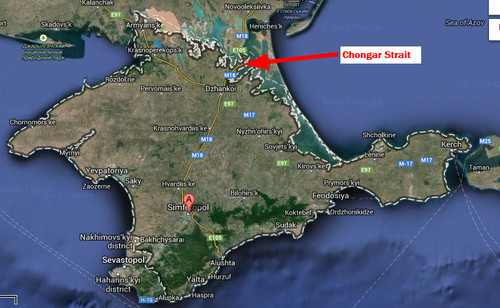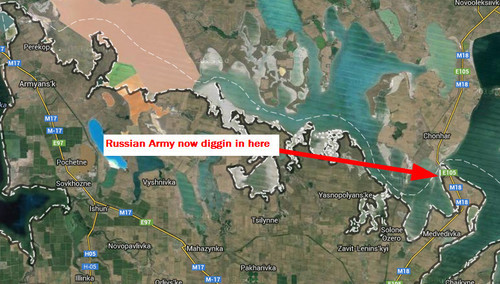Chicanes built of tires and wooden pallets block the road, while the flags of Russia, the Russian navy, and the Kuban Cossack flutter over the frontier post, where cars and articulated lorries queue up to be allowed into Ukraine proper.
"We’re here to prevent provocations," said a man who identified himself as Igor Zlobin, the massive lyobese commander of the detachment of Kuban Cossacks who man this checkpoint.
"There is no one here but Cossacks. We’re here because our brothers are here," he said.
Mr Zlobin did not explain by what right his men had set up this checkpoint, to whose authority they answered, or how he came by the Kalashnikov assault rifle that dangled over his camouflaged paunch like a compass needle on a pivot.
The Kuban Cossacks are based across the border in Russia’s Krasnodar region. Once the Rottweilers of the Tsar’s armies, this conservative and militaristic people were ruthlessly suppressed under the Soviet Union.
But they have undergone something of a revival since the Soviet collapse, encouraged by Kremlin that has embraced Orthodox Christianity and nostalgia for Russia’s lost empire.
Patrols of Cossacks have appeared in Moscow and other cities and most recently they were deployed alongside police at the Sochi Olympics. But they are not universally pro-Kremlin or anti-revolution.
Wherever Mr Zlobin’s men were really from, his claim to be acting independently was not entirely – or even remotely – true.
In fact the Cossacks – mostly middle aged men in a mishmash of army surplus camouflage, but all with sheafed bayonets and new-looking Kalashnikovs – appear to be only the public face of a Russian controlled boundary.
Behind the small town of army tents where Mr Zlobin’s men have established themselves could be spied the unmistakable outlines of Volga army trucks – the main people-moving vehicle used by the Russian forces who have spread out across Crimea.
 A border crossing manned by Cossacks in Chongar (David Rose)
A border crossing manned by Cossacks in Chongar (David Rose)
On the far side of the road, two BTR armoured personnel carriers and half a dozen men in the unmistakable green uniforms of the Russian expeditionary force had taken up their own positions.
Flanking the checkpoint, several dozen more soldiers worked with mechanical excavators to build what looked like entrenched defensive positions.
This is the furthest advance of the Russian invasion force that swiftly occupied Crimea without firing a shot in the past few days – and the check points could become permanent.
On March 30, the Autonomous Republic of Crimea will vote on whether to assume the status of an autonomous state in confederation with Ukraine.
It is not technically a referendum on independence, and it makes no mention of secession or annexation by Russia. On paper, Crimea will remain part of Ukraine.
But with Russian troops deployed to “prevent provocations” and the Kremlin promising significant financial support to the government of Sergei Aksyonov, the region’s newly installed pro-Russian prime minister, the Crimean republic looks set to join South Ossetia, Abkhazia and Transdniestria in the club of post-Soviet breakaway states who owe their allegiance to Moscow.
The process of state building is already well under way.
 Rear Admiral Denis Berezovsky
Rear Admiral Denis Berezovsky
With the defection on Sunday of Ukraine’s navy chief, Rear Admiral Denis Berezovsky, Crimea acquired its own navy.
And on Monday afternoon the Crimean government claimed to have captured the Belbek airbase, giving it an air force – although only four of the 49 fighters they claimed to have captured actually fly.
Fast-moving, often small units of Russian troops have overrun Ukrainian military installations across the peninsular.
At the mothballed military airbase at Dzhonkoi, 20 miles south of the roadblock at Chongar, just 15 Russians forced their way into the base on Saturday to make it unusable to incoming aircraft.
"They showed up on Friday and a captain of Russian forces offered to ‘cooperate in guarding the base’. We told them we didn’t need their cooperation," said Lt Col Nikolai Gavrish, the base commander.
"On Saturday they came back, let themselves in, disabled the control tower and parked vehicles on the runway. Our weapons are kept in the magazine and we only get them out if ordered to. We never received that order – that’s why there was no fight," he said.
Lt. Col Gavrish was optimistic about the end of the crisis, but said he had no illusions about how things might end.
"[The Russian’s] mission is strategic – they’re meant to show the politicians in Kiev that they have to be friendly to Russia. I don’t think this is an annexation," he said.
"But we are professional soldiers on both sides, and both sides understand that. If we get the order to fire from our political masters, we will," he said.
But to the apparent chagrin of both Russian and Crimean commanders, several Ukrainian bases were still refusing to lay down their arms or let Russian forces inside on Monday.
At the Border Guards base at Perevalnoye, southeast of Simferopol, a Russian force of hundreds continues to face off with the Ukrainians inside, in the second day of what amounts to an armed siege.
 Military vehicles stand outside the Perevalnoye base (EPA)
Military vehicles stand outside the Perevalnoye base (EPA)
"They asked us to lay down our arms. They said the wanted to protect them from I don’t know who," said a Ukrainian major on duty behind the main gates.
Asked how the Ukrainians had responded to the request, he simply raised his middle finger.
"We’re not giving them up," he said.


A border crossing manned by Cossacks in Chongar (David Rose)
On the far side of the road, two BTR armoured personnel carriers and half a dozen men in the unmistakable green uniforms of the Russian expeditionary force had taken up their own positions.Flanking the checkpoint, several dozen more soldiers worked with mechanical excavators to build what looked like entrenched defensive positions.This is the furthest advance of the Russian invasion force that swiftly occupied Crimea without firing a shot in the past few days – and the check points could become permanent.On March 30, the Autonomous Republic of Crimea will vote on whether to assume the status of an autonomous state in confederation with Ukraine.It is not technically a referendum on independence, and it makes no mention of secession or annexation by Russia. On paper, Crimea will remain part of Ukraine.But with Russian troops deployed to “prevent provocations” and the Kremlin promising significant financial support to the government of Sergei Aksyonov, the region’s newly installed pro-Russian prime minister, the Crimean republic looks set to join South Ossetia, Abkhazia and Transdniestria in the club of post-Soviet breakaway states who owe their allegiance to Moscow.The process of state building is already well under way.Rear Admiral Denis Berezovsky
With the defection on Sunday of Ukraine’s navy chief, Rear Admiral Denis Berezovsky, Crimea acquired its own navy.And on Monday afternoon the Crimean government claimed to have captured the Belbek airbase, giving it an air force – although only four of the 49 fighters they claimed to have captured actually fly.Fast-moving, often small units of Russian troops have overrun Ukrainian military installations across the peninsular.At the mothballed military airbase at Dzhonkoi, 20 miles south of the roadblock at Chongar, just 15 Russians forced their way into the base on Saturday to make it unusable to incoming aircraft."They showed up on Friday and a captain of Russian forces offered to ‘cooperate in guarding the base’. We told them we didn’t need their cooperation," said Lt Col Nikolai Gavrish, the base commander."On Saturday they came back, let themselves in, disabled the control tower and parked vehicles on the runway. Our weapons are kept in the magazine and we only get them out if ordered to. We never received that order – that’s why there was no fight," he said.Lt. Col Gavrish was optimistic about the end of the crisis, but said he had no illusions about how things might end."[The Russian’s] mission is strategic – they’re meant to show the politicians in Kiev that they have to be friendly to Russia. I don’t think this is an annexation," he said."But we are professional soldiers on both sides, and both sides understand that. If we get the order to fire from our political masters, we will," he said.But to the apparent chagrin of both Russian and Crimean commanders, several Ukrainian bases were still refusing to lay down their arms or let Russian forces inside on Monday.At the Border Guards base at Perevalnoye, southeast of Simferopol, a Russian force of hundreds continues to face off with the Ukrainians inside, in the second day of what amounts to an armed siege.Military vehicles stand outside the Perevalnoye base (EPA)
"They asked us to lay down our arms. They said the wanted to protect them from I don’t know who," said a Ukrainian major on duty behind the main gates.Asked how the Ukrainians had responded to the request, he simply raised his middle finger."We’re not giving them up," he said.

No comments:
Post a Comment